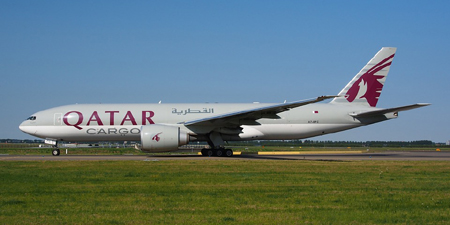Stop using journalists as 'political footballs' in Qatar crisis, demands IFJ
JournalismPakistan.com | Published: 15 June 2017
Join our WhatsApp channel
The International Federation of Journalists has condemned the use of journalists as political pawns amid the Qatar crisis. The ongoing blockade and demands to close Al Jazeera are putting numerous media professionals at risk.Summary
BRUSSELS - The International Federation of Journalists (IFJ) has called on the authorities in a number of Arab states to stop using journalists as “a political football’ as hundreds of media staff face the axe, families risk being torn apart and TV stations, newspapers and websites risk closure.
The call comes as demands to close down Al Jazeera and a blockade of its broadcasts by a number of other countries are having a devastating impact on journalists and their families.
Fifty-five journalists from other Gulf states currently working at Al Jazeera in Doha are under pressure to leave or lose their nationality amid a crisis which threatens the future of broadcasters and other media.
The crisis comes following threats by Saudi Arabia and its coalition partners - including Bahrain, the United Arab Emirates, Egypt and Yemen - to the Qatari authorities to close down Al Jazeera.
The demand was one of 10 put forward by the Saudi-led coalition in its ongoing political dispute with Qatar.
Last week the authorities in the Kingdom of Saudi Arabia closed down Al Jazeera's office in Riyadh and cancelled its operating license. Jordan followed suit by closing Al Jazeera’s Amman office. The Egyptian authorities had already shut down Al Jazeera in 2013 and seized all its equipment at the Cairo office.
Threats have also been made by some members of the government and politicians to close down Al Jazeera in Israel.
The dispute, which has seen Al Jazeera’s broadcasts and access to its websites blocked in a number of countries, is also affecting other media.
In Egypt the authorities have blocked access to Al Jazeera websites and TV channels, in opposition to the broadcaster’s alleged backing for Egypt’s Muslim Brotherhood. They have also taken the opportunity to block other Qatari media and close down independent and critical news websites. Hundreds of journalists’ jobs are at risk, including more than 100 members of the Egyptian Journalists Syndicate.
In the UAE, telecommunication providers, Du and Etisalat, have stopped broadcasting Qatari-owned sports network Bein Sports. It owns the exclusive Middle East rights for the most important sports events in the world including the ongoing French Open tennis tournament, the NBA Finals, Formula One and all the major football competitions.
In Saudi Arabia, the Saudi Commission for Tourism and National Heritage has joined the authorities in Bahrain in banning tourist destinations from airing Al Jazeera. Violations of these injunctions face fines up to SR 100,000 (€23,800), closure, revocation of tourism licenses, and even imprisonment.
Even Saudi citizens can be fined up to $2700 if caught watching Al Jazeera.
The blockade is already impacting journalists. Nationals from other Gulf States working at Al Jazeera and other media in Qatar have been told they must leave the country or face losing their right to return home and even their nationality.
The Saudi authorities have given their nationals two weeks to leave or lose their citizenship.
This is having an impact on thousands of people, in particular journalists working in Doha for Al Jazeera and other Qatari media.
At Al Jazeera and Bein Sports alone 44 Saudi nationals, 13 Bahrainis and one from the United Arab Emirates are under threat.
There is also a brutal impact on families that face being broken apart.
With hundreds of journalists having settled in Doha as they took up work with Qatari media, many have put down roots and married Qataris. Now those families face being forced apart.
UN human rights chief Zeid Ra'ad Al Hussein has warned of the humanitarian crisis such actions are having.
IFJ General Secretary Anthony Bellanger said: “We utterly condemn moves to force the closure of Al Jazeera, throw its journalists out of jobs and undermine the freedom to inform, and the right to free speech and free media.
“Journalists doing their jobs and their families – husbands, wives and children - must not be used as political footballs in this dispute.
“There is now a grave danger their human rights are being violated.
“The IFJ will stand in support of every journalist – whether from Qatar or the states imposing the blockade and sanctions – to help defend their right to work, their job and their fundamental human rights.”
Amnesty International has also called for action. “For potentially thousands of people across the Gulf, the effect of the steps imposed in the wake of this political dispute is suffering, heartbreak and fear,” said James Lynch, its Deputy Director of Global Issues Program.
“These drastic measures are already having a brutal effect, splitting children from parents and husbands from wives. People from across the region – not only from Qatar, but also from the states implementing these measures – risk losing jobs and having their education disrupted. All the states involved in this dispute must ensure their actions do not lead to human rights violations.” – IFJ media release
KEY POINTS:
- IFJ calls for an end to the political manipulation of journalists in the Qatar crisis.
- Hundreds of media staff face job losses and displacement due to pressures from several Arab states.
- Al Jazeera has faced closure threats and operational restrictions in multiple countries.
- Saudi nationals working in Qatar are at risk of losing their citizenship if they do not leave.
- The humanitarian impact includes family separations and threats to free expression.

























